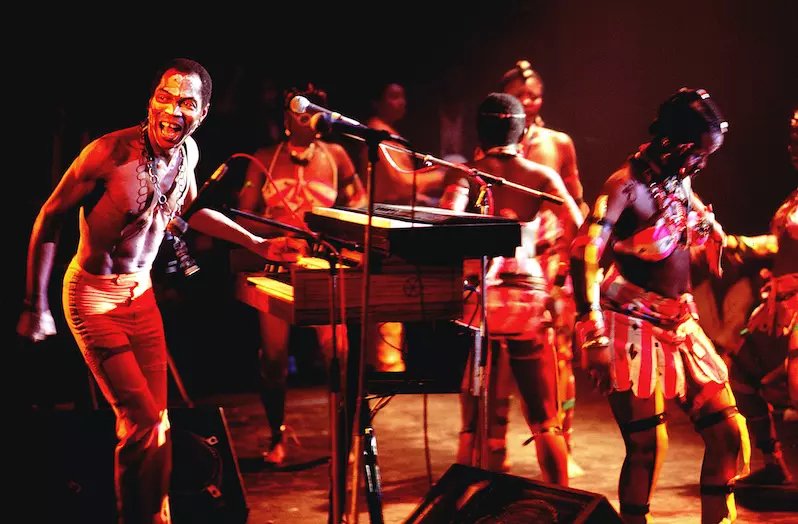April 28, 2023
It's been a while since I've done one of these One Song posts, and in this case that title is somewhat misleading because I'll actually be talking about several songs.
Recently I've been listening through all of the African albums in my collection, with an ear to choosing which ones I might use in future DJ sets.
[Brief digression: During the COVID-19 lockdown, on a whim I bought a used Pioneer XDJ-R1 DJ controller. It's ancient tech by now but works just fine, allowing me to play from CDs or audio files stored on a USB stick. Since lockdown I've not felt very inspired musically, so this seemed like a way to keep myself engaged with music (something new to learn) and to get more use from my rather sprawling music collection. I was a DJ on community radio stations throughout the 80s and 90s (KAOS-fm in Olympia, WFMU in New Jersey, KUNM in Albuquerque), but I've never used a digital controller or DJ-ed in a room full of people. I have no interest in ever spinning thumping techno beats in dance clubs; instead I imagine myself playing an extremely eclectic mix of styles for private parties, or maybe at some small neighborhood lounge. So call me if you ever want that sort of thing.]
Anyway, listening again to all this African music brings me to Fela Kuti, the late and great Nigerian musician/singer/bandleader, nightclub operator, rabble-rouser, and founder of a style he called Afrobeat that combines elements of Nigerian highlife music, 1970s-era James Brown-style funk grooves, jazz, and political ranting. Even if you don't know his music, you've likely heard his influence on folks like Talking Heads and Michael Jackson. If you’re interested, the documentary Music Is the Weapon is worth watching as an introduction.
Trying to select a few Fela songs for DJ use – never mind just one – is tough because, a) his catalog is so vast it's hard to know where to begin (here's a decent primer), b) most of his songs are around fifteen minutes long (his albums typically featured one song per side), and c) they tend to all stick to a certain formula (hypnotic rhythm section groove, punchy horn riffs, Fela solos on electric keyboards and/or tenor sax, followed by Fela's singing/lecture with female chorus interjections, followed by another solo or two).
I was introduced to Fela's music in 1980 when a DJ at KAOS played his song Upside Down. I immediately went out and bought the LP. And to be honest, that remains my favorite Fela song and my first choice if I were forced to pick One Song of his. I love the fluid guitar riff that holds it all together, and the super funky horn parts. I also really like the lead vocals. But this is a very controversial choice because as far as I know it's the only Fela song on which he does not sing. The lead vocal is by Sandra Izsadore, an African-American activist and Black Panthers member who befriended and radicalized Fela when he was in the US in the late 60s. It's a strong performance, too, but I'm pretty sure most Fela fans would heartily disagree with me on this.
That brings me to my less heretical alternate choice, though I still doubt that most hardcore fans would agree with me. Recorded in 1977, Sorrow, Tears, and Blood was inspired by the 1976 Soweto Uprising in South Africa, although Fela uses that event as an analog for the violent military/police raid on his own family compound, the Kalakuta Republic, which he had proclaimed an autonomous state. Fela's vocal explicitly evokes the terror and chaos of these horrible events over a solid mid-tempo groove, and his tenor sax soloing here is fairly restrained. (Fela's detractors tend to rag on his sax playing, which is admittedly hit-and-miss, especially by jazz standards.)
While I'm making unpopular pronouncements about Fela songs, I'll take a moment to stick my neck out further and weigh in on one of the other more controversial Fela records. Army Arrangement was first released by Celluloid Records in 1985. The plan was for Fela to come to New York to mix the tapes with Bill Laswell, but he was arrested at the airport while trying to board the plane with a large amount of cash. While Fela sat in jail for eighteen months on trumped-up charges, the tapes were sent on to Laswell, who felt they had problems and commenced to take some unauthorized creative liberties with them, mixing out Fela's solos and adding overdubs by keyboardist Bernie Worrell (Parliament/Funkadelic) on Hammond organ, drummer Sly Dunbar (every great reggae record) on electronic drums, and Senegalese drummer Aiyb Dieng on talking drum. He also cut the track's original 30-minute length nearly in half. Fela famously hated the results, and Laswell wasn't especially apologetic. The track was eventually released in its original form, but as much as I appreciate that version and understand and respect Fela's feelings on the situation, I confess I have a slight preference for the Laswell mix, precisely because it sounds different from every other Fela album and so stands out from the usual formula. OK, shields up!
